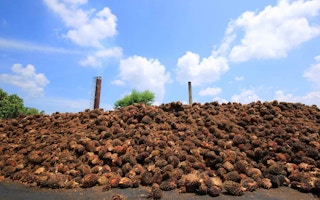Scientists in Malaysia are perfecting a method to produce high-protein animal feed from palm waste and fungi, offering a potential outlet for by-products of controversial palm oil production, a paper says.
Farmers often use agro-industrial waste — such as rice bran — as animal feed, but these crop residues lack protein, vitamins and other nutrients, the study says.
The scientists from the University of Malaysia Perlis (UniMAP) used the fungus Aspergillus terreus to produce large amounts of protein through the fermentation of palm pressed fibre and palm oil decanter cakes, two types of palm oil milling residue.
This approach is cheaper than adding micro-ingredients to the initial low-cost feed, the team says. It would also make use of waste from the flourishing palm oil industry.
According to a 2007 report by the United Nations Environment Programme, 30,000 square kilometres of forest will be lost every year in Indonesia by 2020 to make room for growing oil palm plantations.
“We opted to focus our research on palm oil agro-industrial waste due to its abundance from this industry,” says co-author Zarina Zakaria, a biotechnology researcher at UniMAP.
Fermenting the palm oil by-products with the fungus for seven days at 32 degrees Celsius increased their protein content from 159 to 401 milligrams per litre for palm-pressed fibre, and from 146 to 493 milligrams per litre for palm oil decanter cake.
“Our research is still in its early stages, but with further testing it is possible to replicate the process using different types of agro-industrial waste with other strains of microorganisms,” Zakaria adds.










